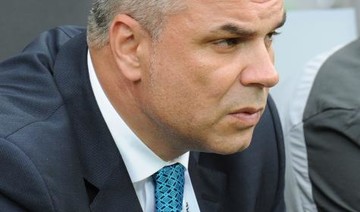RIYADH: Amid the most astonishing scenes that this, or indeed any, tournament is ever likely to see, Algeria beat hosts Qatar 2-1 on Wednesday in the second semi-final of the 2021 FIFA Arab Cup to earn a final against rivals Tunisia on Saturday.
Here are five things we learned from a roller-coaster game that looked like it would never end.
1. You will not see a finish like that for a long time
A long time! The 19 minutes of stoppage time was simply incredible. No one will know why so long was added but no one will ever forget what happened.
It looked as if the hosts had run out of ideas as the 90-minute mark approached with them trailing 1-0, but there were gasps when the fourth official held up a board to announce nine minutes of added time in a game that had not seen a lengthy injury break.
The Algerians bench was up in arms and even more so seven minutes later when Mohammed Muntari scored with a textbook header. Algeria were furious and instant online conspiracies were hatched accusing the hosts of getting a favorable decision with the Polish referee waiting until the hosts scored.
Such claims were silenced in the 15th minute of stoppage time (there had been some pushing and shoving after the Qatar goal but still…) as Algeria got a penalty when Yacine Brahimi was brought down and Mohamed Belaili, the hero of the quarter-final win over Morocco, stepped up. His initial shot was saved by Saad Al-Sheeb but he quickly fired home the rebound.
There was still another minute or so played and the final whistle finally sounded after 19 minutes of added time.
It was Qatar’s turn to be unhappy about the time added but, in the end, it was the right result.
2. Qatar could not capitalize on bright start
The Asian champions went at their African counterparts from the first whistle, pressing high and getting men forward as much as possible. The Maroons had swept the UAE aside in the first half of the quarter-final, earning praise from Dwight Yorke.
The former Manchester United star who was watching the match as part of FIFA’s technical study team, said: “Their intention was very clear from the very first whistle: Try and push the UAE back toward their own goal, press them high up the pitch when they could as well, force them into making an early mistake. And they got their reward.”
Qatar attempted to do the same with Algeria and were soon winning possession in advanced positions. With Almoez Ali and Akram Afif, the deadly duo of Asian football, looking dangerous and in tune with one another, the early signs were encouraging but the breakthrough did not come. There was to be no repeat of the UAE first-half blitz.
3. Bounedjah caused problems on his return
In the second half of the first half, Algeria were well and truly in the game and ended the period in control. Indeed, they really should have taken the lead after 35 minutes. Baghdad Bounedjah slipped the ball to Brahimi inside the area and the forward, who plays his club football in Qatar for Al-Rayyan, struck his shot straight at the goalkeeper.
Bounedjah’s return was a welcome sight after he had missed the quarter-final win over Morocco due to concussion. He is an excellent No. 9 and led the line well, providing a constant outlet for his team-mates and causing problems for the Qatar defense as he has done consistently since joining Al-Sadd in 2015. The fact that he has averaged more than a goal a game in the Qatar Stars League tells you all you need to know.
The defense kept a close eye on the 30-year-old, but he remained a threat throughout the game, and it was no coincidence that Qatar started to get back into the match after the striker went off in the 68th minute.
4. Qatar should be satisfied but there is still work to do
Despite the crazy ending, Algeria deserved the win. The Fennecs carried on in the second half as they had ended the first — well on top. Qatar goalkeeper Al-Sheeb was the busier of the two No. 1s and it was only in the final stages that the hosts really started to threaten as Algeria, who were taken to a penalty shootout by Morocco three days earlier, started to tire.
Qatar had won all four games in the tournament, but these had come against Asian opposition. Meeting an African team for the first time, and one without European-based stars, proved to be a tough test. Qatar never gave up and tried to play aggressively but after doing the hard part, and getting the equalizer, failed to manage the game and take it to extra time.
There were many positives, however. Qatar have improved greatly in the last few years and a bit more international experience and composure could see the team have a good World Cup next year.
5. The final should be a treat but Tunisia need it more
Tunisia and Algeria should give the Arab world a fitting final. Both teams have shown heart, determination, and no small skill to get there. Fans thought that Tunisia’s 95th-minute winner against Egypt was a demonstration on how to keep going until the end but then Algeria’s stoppage-time winner came 12 minutes later.
Neither team are at full strength, but both would love to end 2021 and prepare for a busy 2022 by lifting a trophy — especially Tunisia.
Algeria are the defending champions of Africa but Tunisia have to go back to 2004 when they last won the continental crown. Winning the Arab Cup, 58 years after lifting the inaugural trophy, would really get fans and players in the mood for Africa’s premier tournament next month.
Whatever happens, if the final is as dramatic as the semis then we are all in for a treat.


























